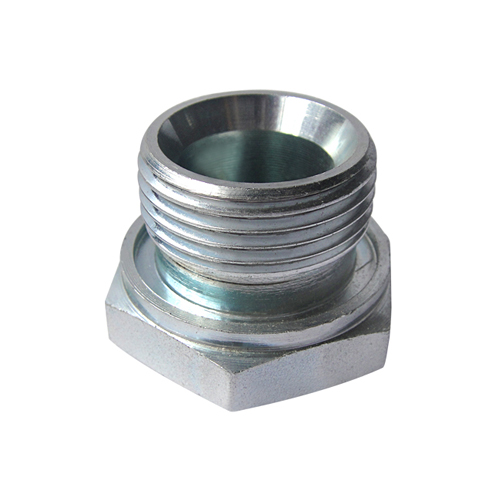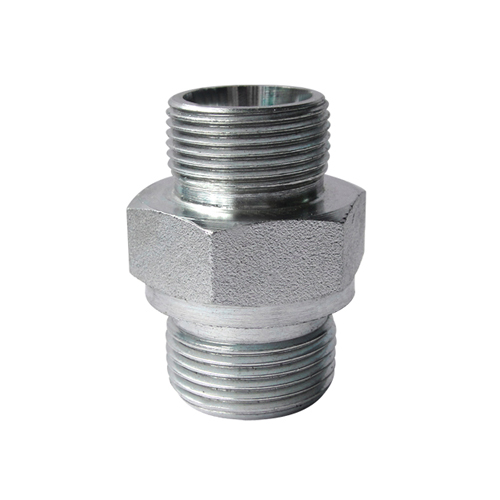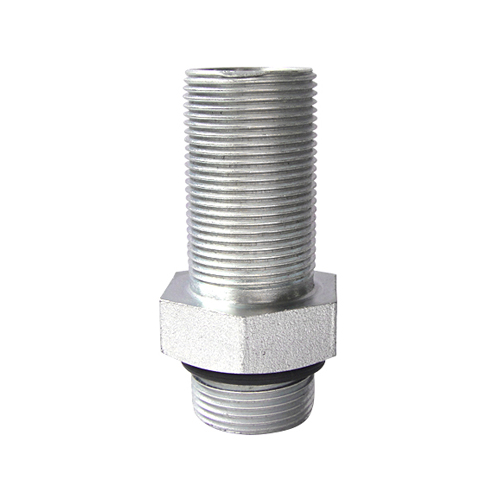Hydraulic systems are fundamental in various industries, from manufacturing and construction to aerospace and agriculture. These systems rely on hydraulic fittings to securely connect and control the flow of fluids under high pressure. While hydraulic fittings may seem like a small component of a hydraulic system, their quality plays a crucial role in the overall performance, safety, and longevity of the system. Hoson, a leading manufacturer of hydraulic fittings, has made it their mission to deliver high-quality products that meet the most demanding standards. However, it’s important to recognize the potential disadvantages of using low-quality hydraulic fittings, which can have significant impacts on system efficiency, safety, and maintenance costs.
1. Increased Risk of Leaks
One of the most immediate risks associated with low-quality hydraulic fittings is the increased likelihood of leaks. Hydraulic fittings are designed to withstand high pressures, and they must create a tight, secure seal to prevent fluid leakage. Low-quality fittings may have poor thread integrity, faulty seals, or substandard materials that fail to form an adequate seal, leading to leaks. These leaks can not only cause fluid wastage but also pose safety hazards to operators and machinery. In extreme cases, leaks can lead to catastrophic failure of the hydraulic system.
Hoson Hydraulic Fittings are crafted using precision manufacturing techniques and high-grade materials to ensure a perfect fit and a robust seal, reducing the risk of leaks even under the most demanding conditions.
2. Reduced Performance and Efficiency
Hydraulic systems depend on the seamless flow of fluid through various components, including valves, cylinders, and hoses. Low-quality fittings can cause restrictions in fluid flow due to imperfections such as rough surfaces, inconsistent diameters, or poorly aligned threads. This leads to pressure drops and inefficient fluid circulation, reducing the overall performance of the system. When the fittings don’t perform as expected, the hydraulic system has to work harder, which can lead to slower response times and reduced operational efficiency.
By contrast, Hoson Hydraulic Fittings are designed to minimize friction and ensure smooth fluid flow, optimizing the system's overall efficiency and responsiveness.

3. Increased Wear and Tear on Components
Low-quality fittings are often made from substandard materials that wear out more quickly, leading to increased friction and stress on the surrounding components. These fittings may corrode or degrade over time, which accelerates wear and tear on the hydraulic system, including pumps, hoses, and valves. As these components are subjected to increased friction and wear, the risk of failure rises, and maintenance costs increase.
Hoson’s high-quality hydraulic fittings are crafted from durable materials, such as corrosion-resistant alloys, that provide long-lasting performance and reduce the likelihood of premature wear, ensuring that other system components remain in optimal condition for longer.
4. Increased Maintenance and Repair Costs
Using low-quality hydraulic fittings can lead to frequent breakdowns, increased wear, and more complex repairs. When leaks occur, or the fittings fail, it can be costly to replace them and repair any damaged parts of the system. Additionally, because low-quality fittings can lead to inefficient fluid flow, other parts of the system may be forced to work harder, increasing the likelihood of additional breakdowns. Over time, this can result in a significant increase in maintenance and repair costs.
In contrast, Hoson Hydraulic Fittings are built for longevity and reliability, minimizing the need for repairs and ensuring that your hydraulic system remains operational with minimal downtime.
5. Potential for System Failures
The most serious disadvantage of using low-quality hydraulic fittings is the potential for total system failure. If a fitting fails under pressure, it can cause the entire hydraulic system to malfunction, leading to equipment downtime, safety hazards, and expensive repairs. In the worst-case scenario, a fitting failure can even lead to catastrophic accidents, especially in industries that deal with heavy machinery or high-pressure systems.
Hoson Hydraulic Fittings undergo rigorous testing and quality control to meet the highest safety standards. By choosing Hoson’s reliable fittings, you can significantly reduce the risk of failure and ensure that your hydraulic system operates safely and effectively.

6. Incompatibility with Other Components
Hydraulic systems often involve a wide range of components, from hoses and pipes to valves and actuators. Low-quality hydraulic fittings may not be designed to work seamlessly with other system components, leading to compatibility issues. These fittings may not have the correct dimensions or threading to properly connect to other parts of the system, resulting in leaks, misalignments, or difficulty during assembly. Incompatible fittings can also cause additional stress on the system, leading to inefficient performance or failure.
Hoson ensures that its hydraulic fittings are compatible with a wide range of industry-standard components, making them easy to integrate into existing systems and minimizing the risk of compatibility issues.
7. Decreased Safety Standards
Hydraulic systems often operate under high pressures and in hazardous environments. Low-quality fittings can compromise the safety of the entire system, as they are less reliable in maintaining pressure and preventing fluid leaks. In the case of a failure, hydraulic fluid can leak into sensitive areas, creating fire hazards or slip-and-fall risks. Additionally, if the fitting fails under pressure, it can cause violent ejection of fluid or debris, potentially injuring operators or workers in the vicinity.
Hoson’s hydraulic fittings are engineered to meet stringent safety standards, with high-strength materials and designs that ensure reliable pressure containment and protection against leaks. This significantly enhances the safety of the hydraulic system and the work environment.
8. Lower Long-Term Value
While low-quality hydraulic fittings may have a lower initial cost, they can result in higher long-term expenses. Frequent maintenance, repairs, and part replacements can quickly outweigh the savings made on cheaper fittings. In addition, a poorly functioning hydraulic system can lead to decreased productivity, increased downtime, and more expensive energy consumption, ultimately reducing the overall value of the system.
In contrast, Hoson Hydraulic Fittings offer long-term value by providing reliable, efficient, and durable performance. Investing in high-quality fittings reduces the need for frequent repairs and replacements, ensuring that your hydraulic system operates at peak efficiency for many years.

9. Environmental Impact
Substandard hydraulic fittings often fail more quickly, resulting in the need for more frequent replacements. This leads to increased waste and a higher consumption of resources, which can have a negative environmental impact. Furthermore, low-quality fittings may not be designed to meet industry environmental standards, which can result in leaks that contaminate the surrounding environment.
Hoson’s hydraulic fittings are built to last and meet environmental regulations, reducing waste and ensuring that the system operates in an eco-friendly manner. By using high-quality materials and manufacturing processes, Hoson contributes to sustainability in the hydraulic industry.
10. Negative Impact on Brand Reputation
In industries where hydraulic systems are critical to operations, using low-quality components can result in product failures, delays, and poor performance. If a hydraulic system fails due to poor-quality fittings, it can reflect poorly on the reputation of the business or manufacturer. This can lead to customer dissatisfaction, loss of business, and a tarnished brand image.
Hoson’s commitment to quality ensures that customers receive reliable, high-performance hydraulic fittings that contribute to the success and reputation of their business. By prioritizing quality, Hoson helps companies maintain a positive reputation and customer loyalty.
By understanding the potential disadvantages of low-quality hydraulic fittings, businesses can make informed decisions about their hydraulic system components. Hoson Hydraulic Fittings offer a reliable, cost-effective solution to the challenges posed by low-quality alternatives, ensuring that systems run smoothly, efficiently, and safely.



